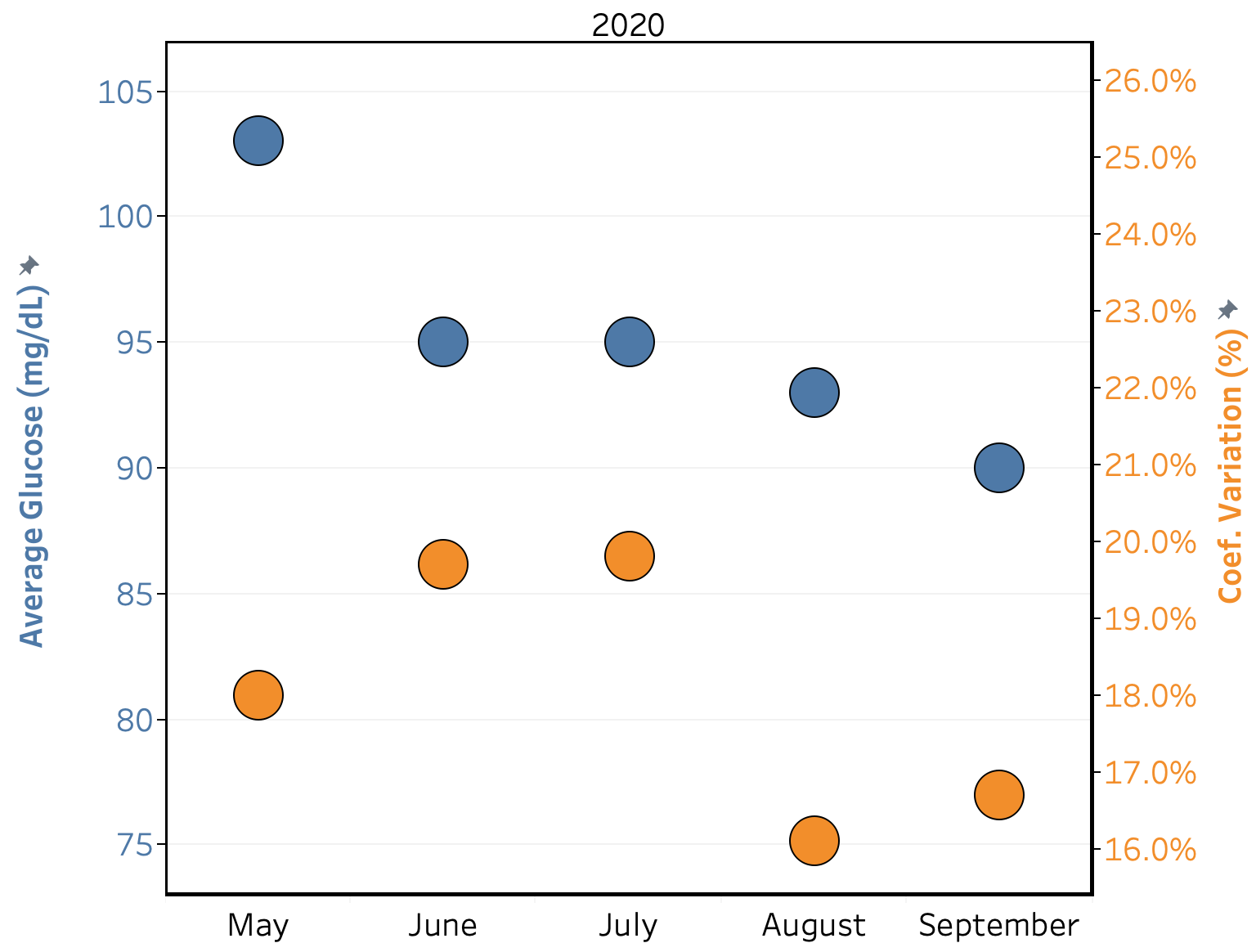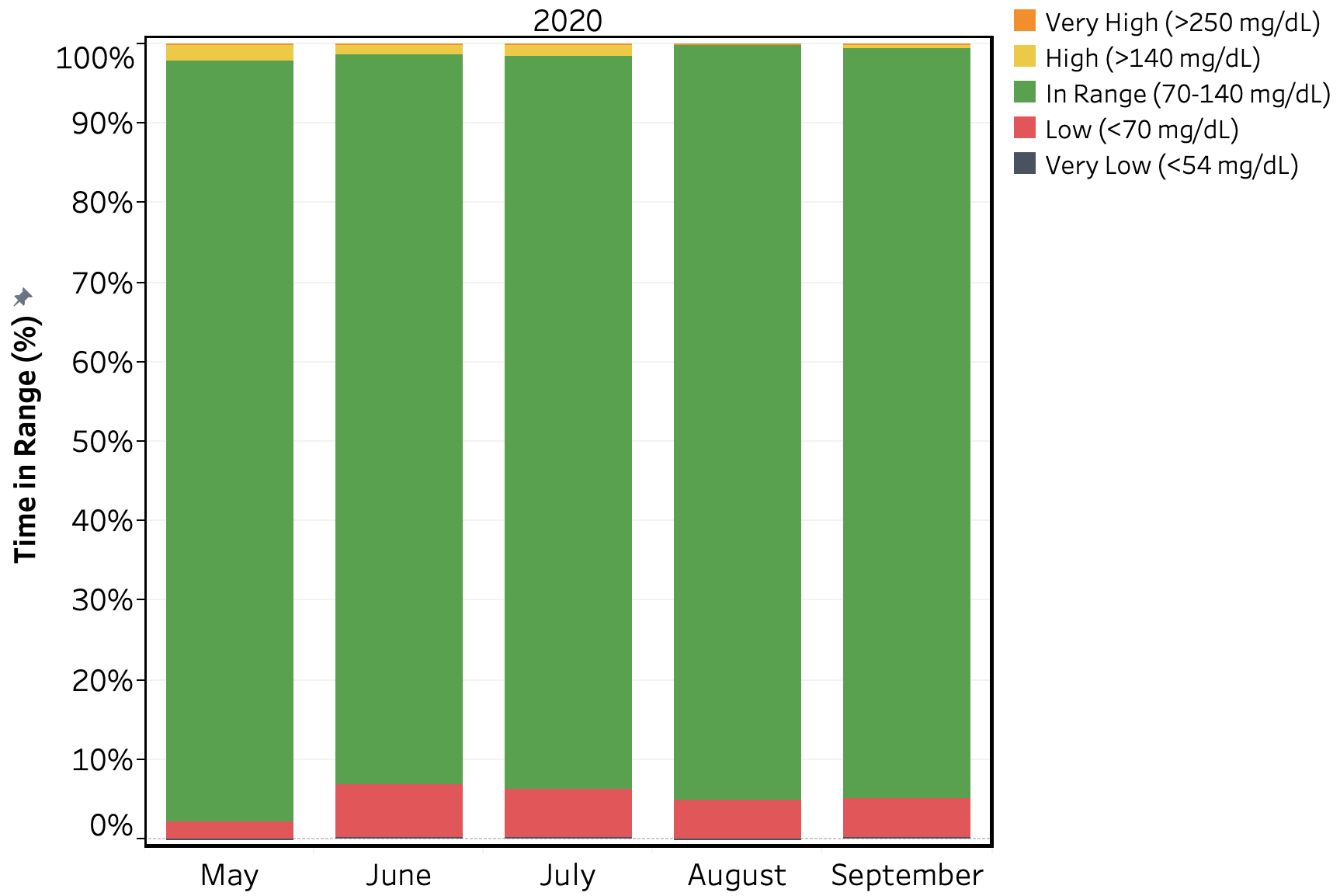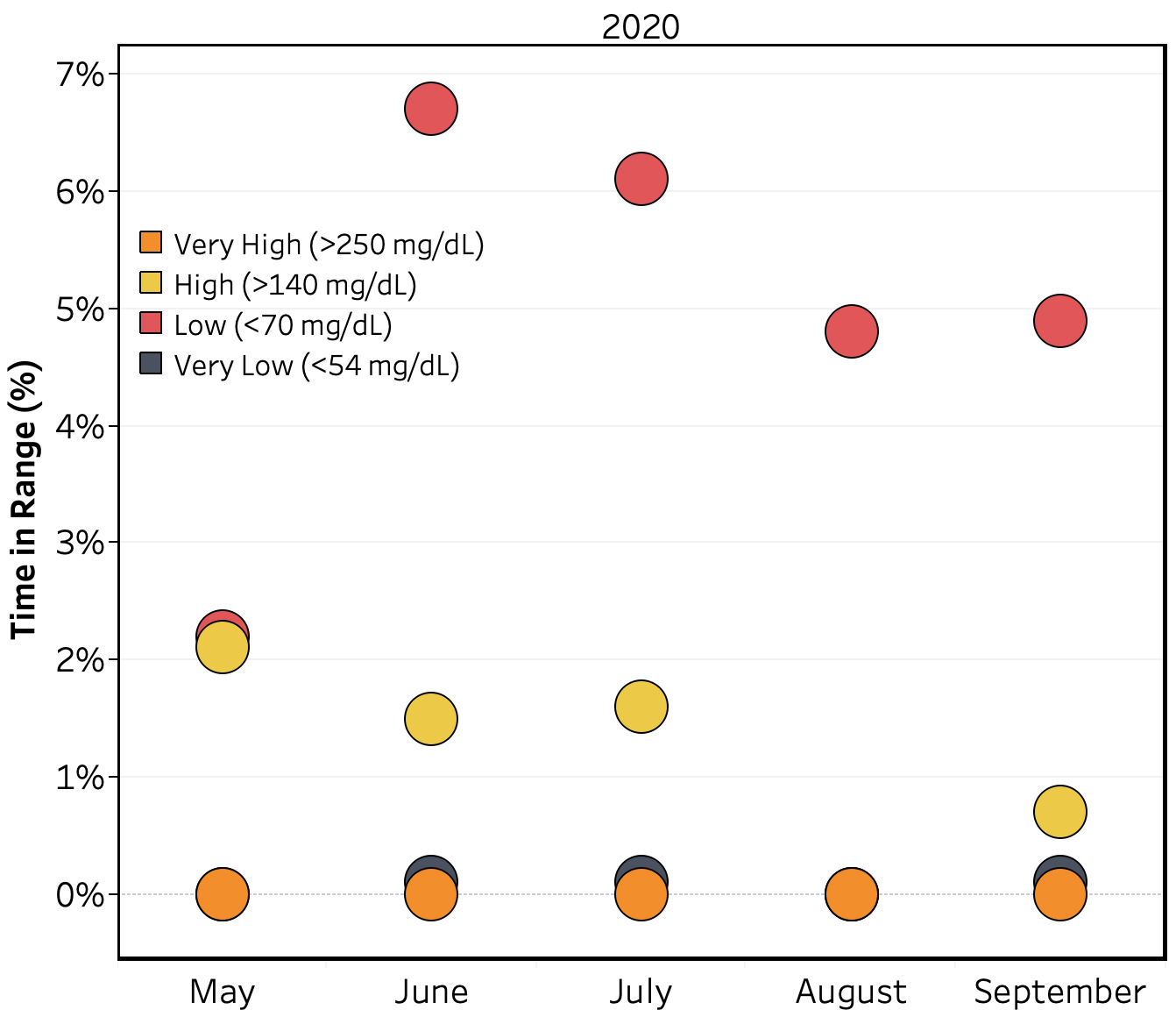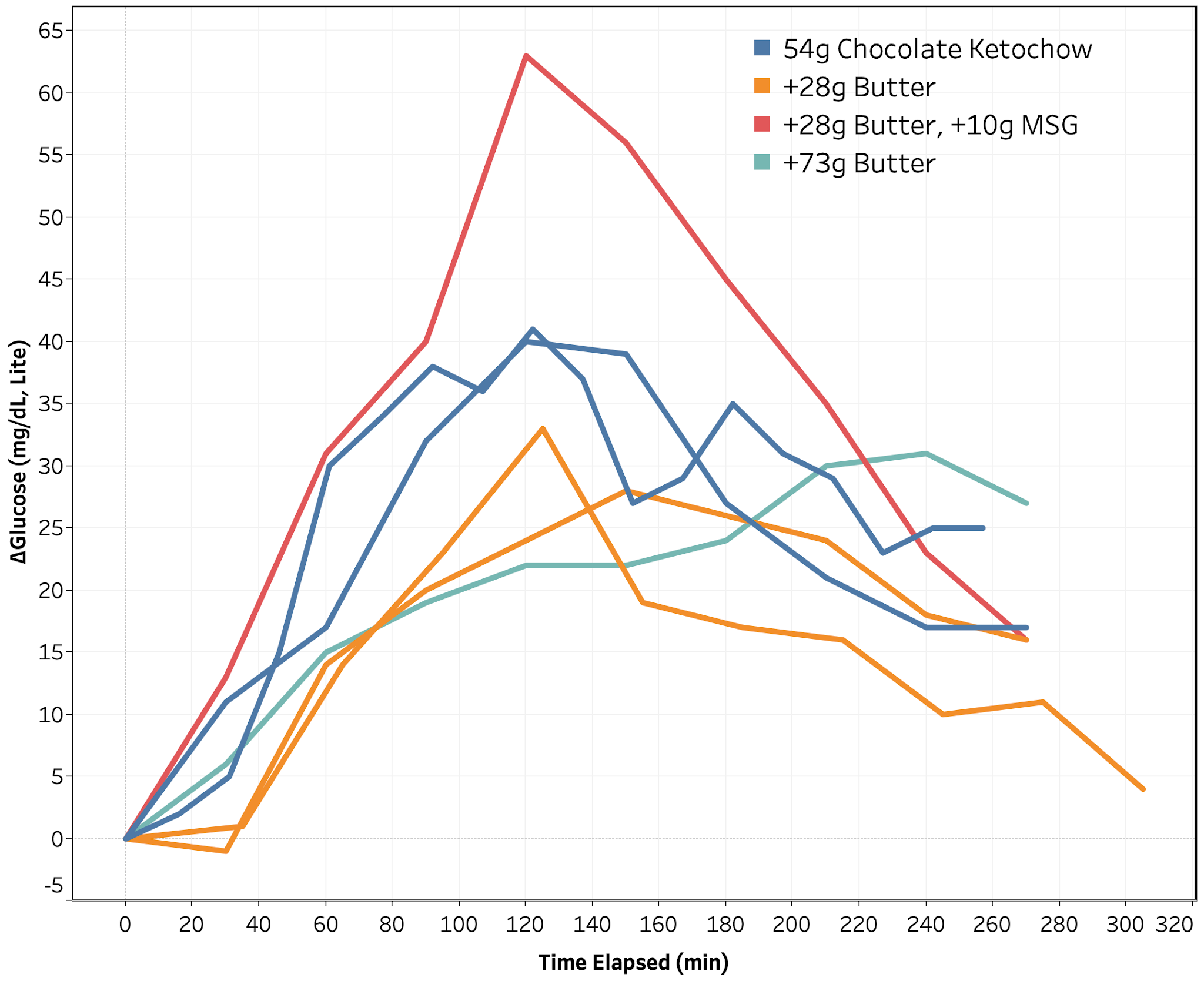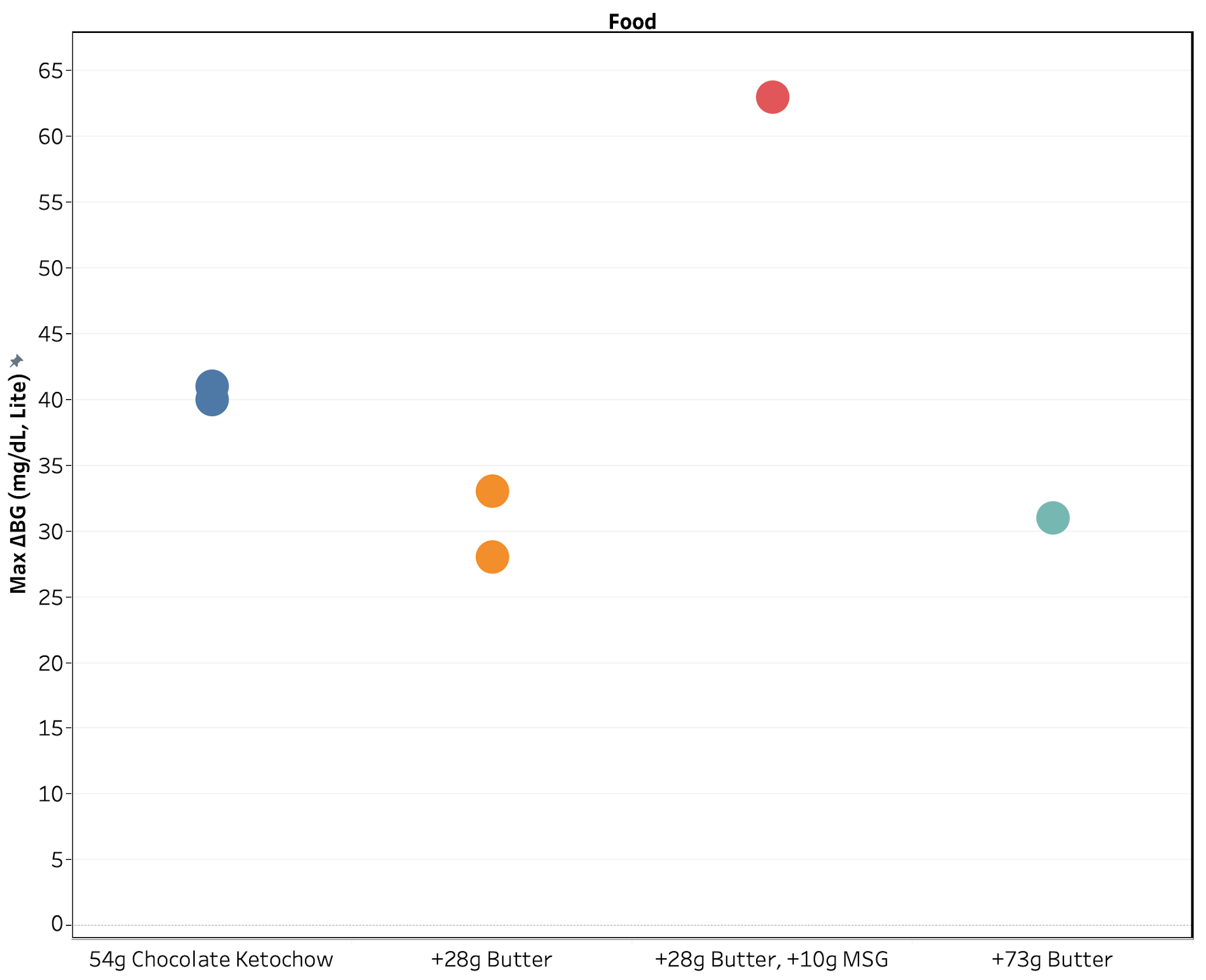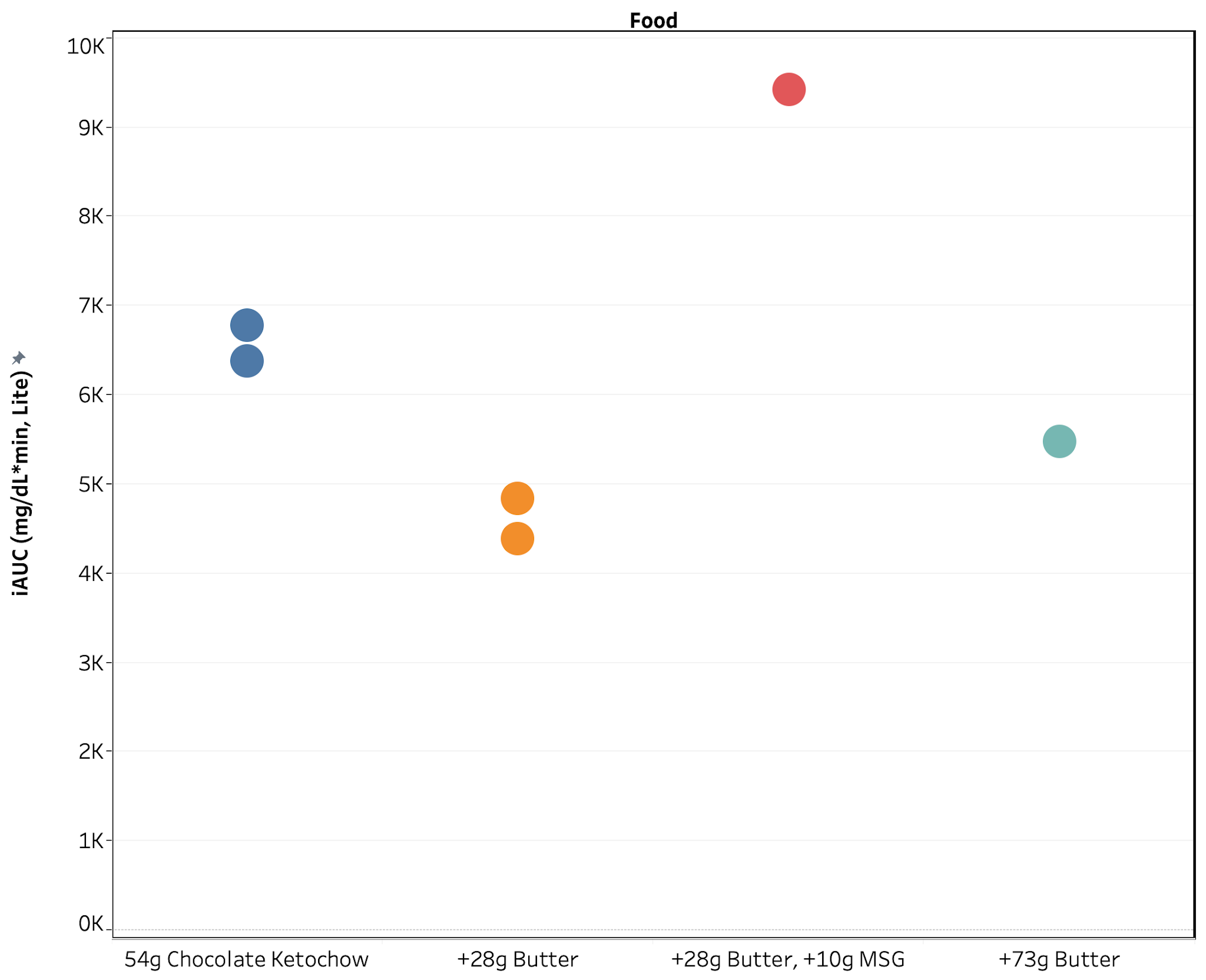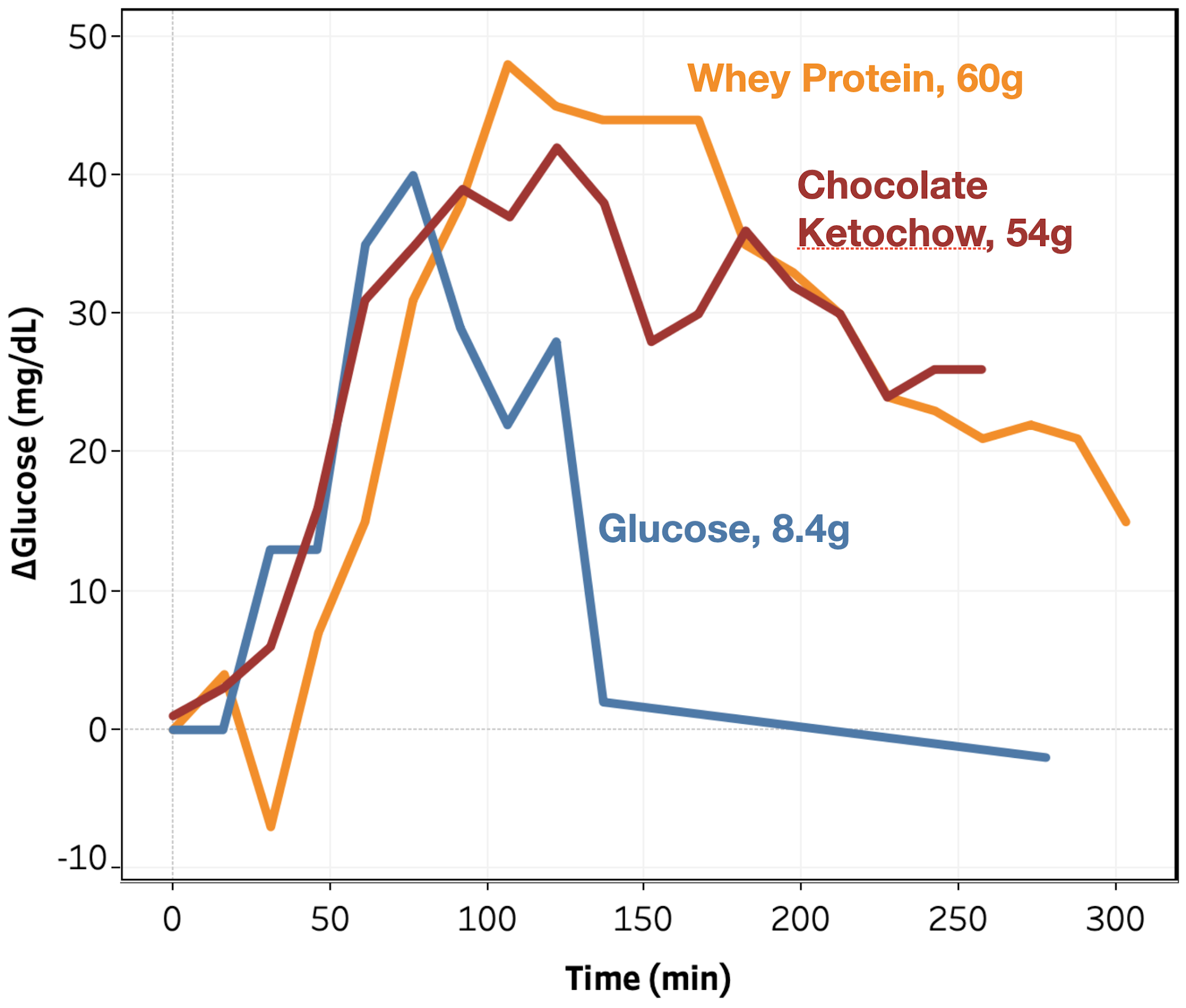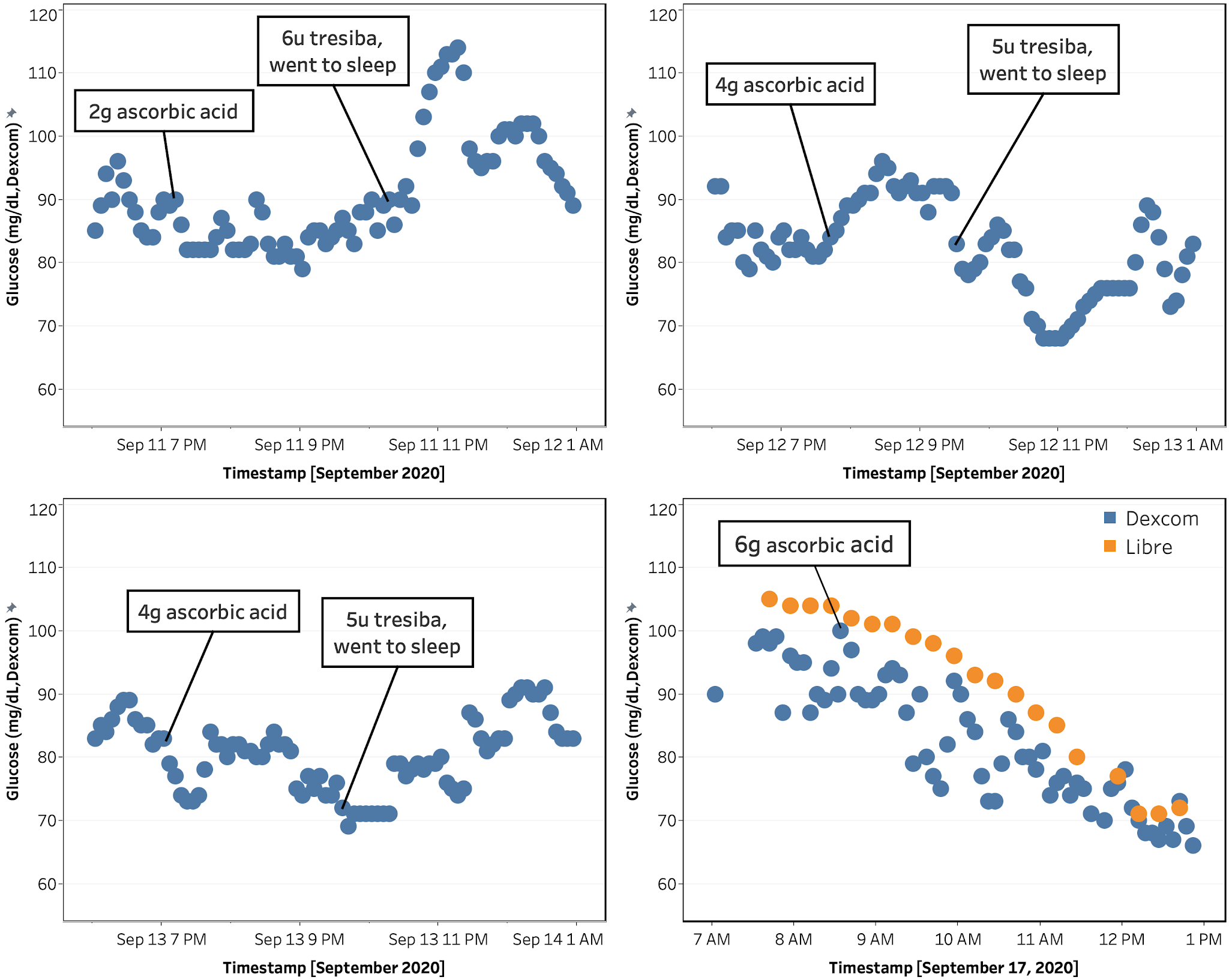Get new posts by email or rss feed
This is an update on my experiments measuring the effect of dietary supplements and low-carb foods on blood sugar.
Summary
- A couple weeks ago, I posted an initial test of MSG on my blood glucose. Surprisingly, I saw a significant increase in the rate of rise, peak, and iAuC of my blood glucose.
- That was a single experiment, though, so I over the last two weeks I repeated the experiment and also tested the effect in combination with insulin.
- The results were very consistent, with 10g MSG causing a 30 mg/dL (2x) increase in peak blood glucose over 2h. This was 3x higher than the rise observed from MSG alone.
- Surprisingly, when I tried the same experiment, but with my standard insulin dose, the MSG had virtually no effect (there was an ~10 mg/dL drop in the first couple hours, but this was followed by a rise to the same peak and is within normal day-to-day variation).
- I was really surprised by these results, particularly the fact that MSG has such a drastically different effect when taken with vs. without insulin. I’m really not sure what to make of that. The only two hypotheses I can think of are:
- MSG inhibits endogenous insulin production (leading to the higher blood glucose rise), but does not impact insulin sensitivity (and therefore doesn’t impact blood glucose in the presence of injected insulin).
- MSG promotes gluconeogenesis when insulin concentration is low, but not when it’s higher.
- I’m not sure how to test these hypotheses with what I have available (blood glucose meter).
Does anyone have other hypotheses as to what might be going on or how to test it? I’m also looking for anyone who might be interested in helping me test this effect. There’s a huge range of variables here (amino acid type, quantity, protein/carb/fat ratio of the meal, whether the person has diabetes and what type).
If you have any ideas or would like to help out, please let me know.
As always, if you have any comments, suggestions, ideas for new experiments, or want to participate, please let me know in the comments or send a PM via the contact form or to quantifieddiabetes_at_gmail.com.
Planned Experiments:
- Baseline:
- Glucose re-test
- Fasting re-test
- Low-carb foods:
- Ketochow: Complete
- Carbquick: Started
- Eggs
- Supplements:
- Vinegar
- MSG: this post
Preliminary Results: MSG
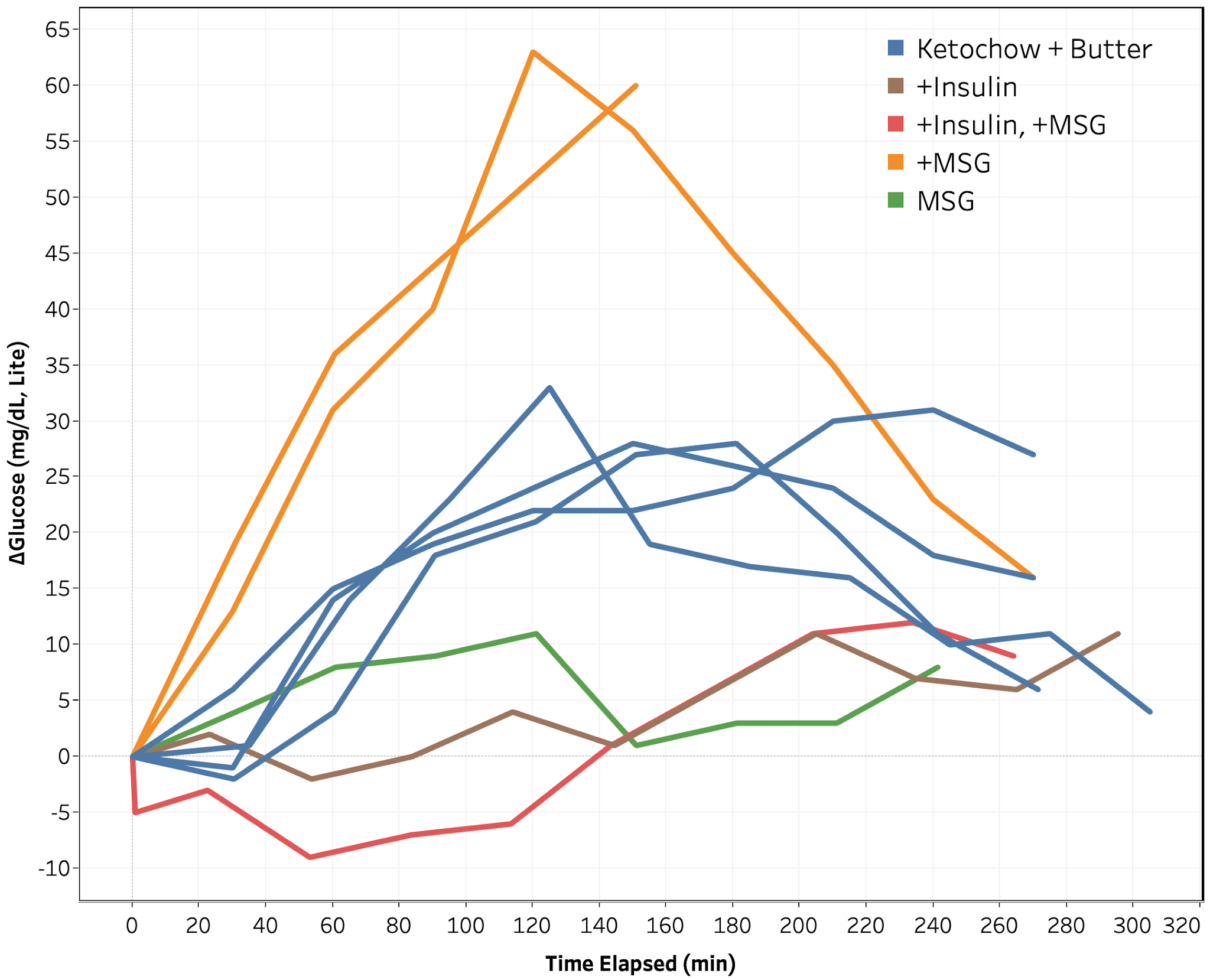
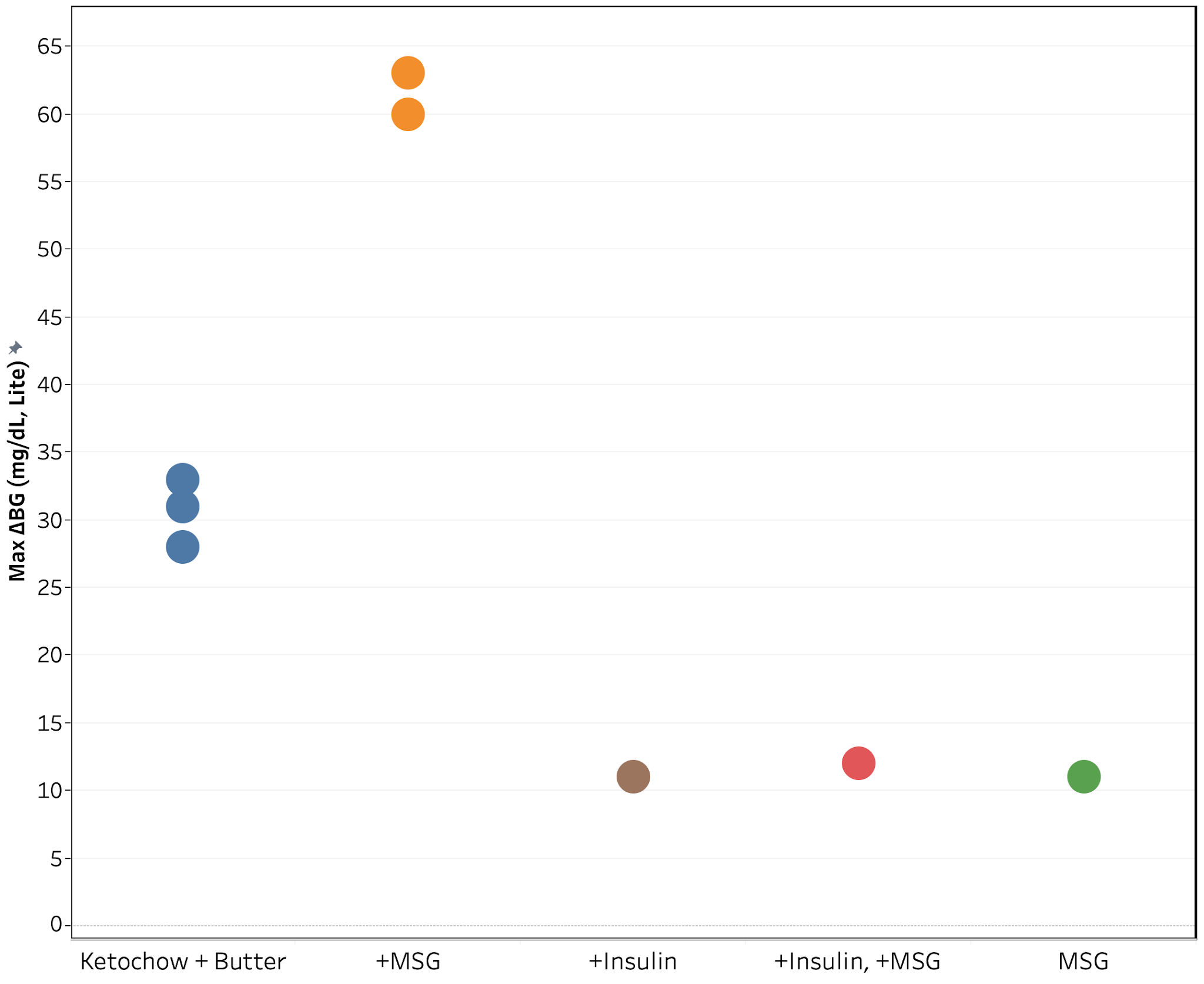
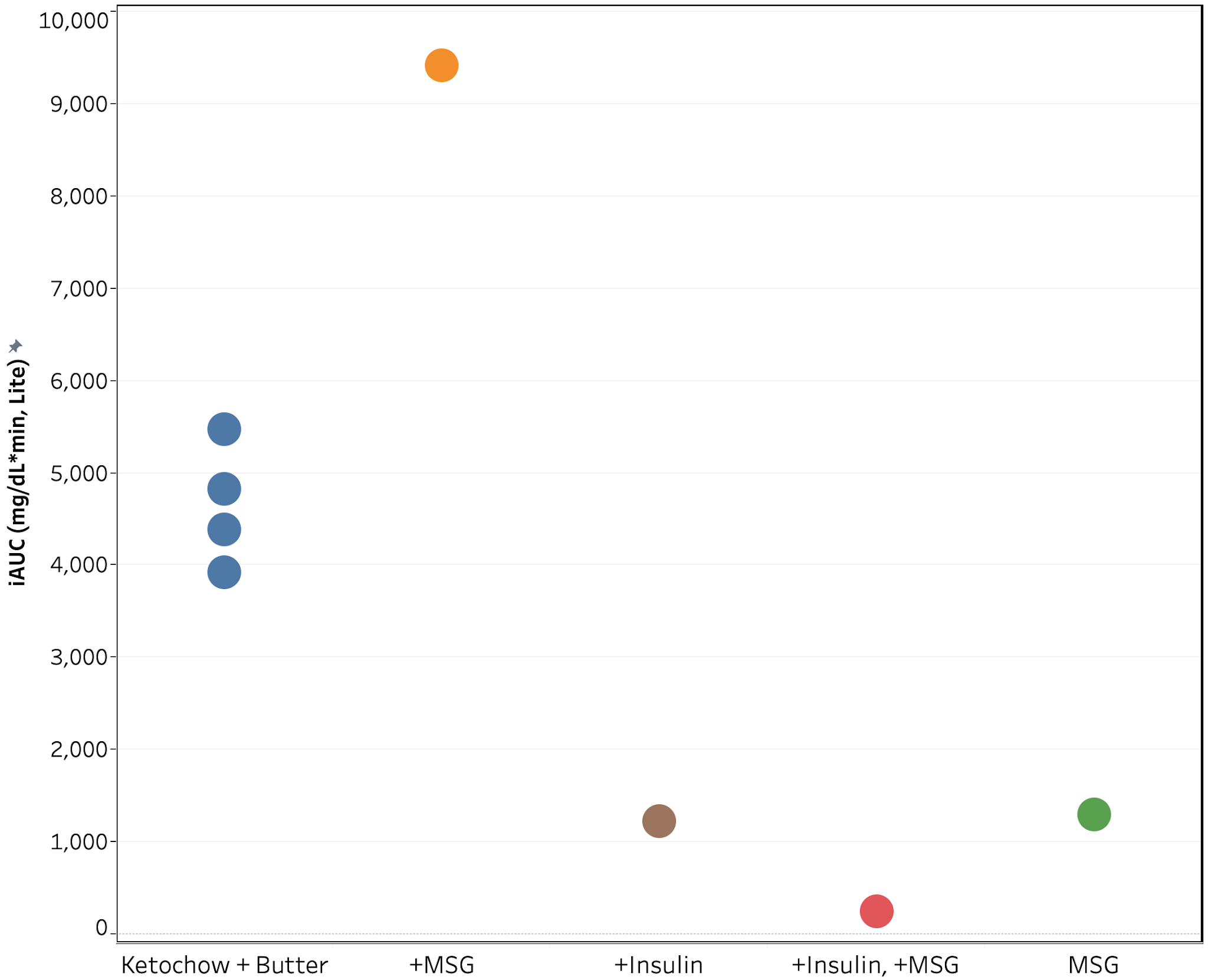
Ingredient Background
Ketochow is a low-carb meal-replacement that is designed to have all the macro- and micro-nutrients you need to stay healthy. I have it for breakfast and lunch most days. It’s extremely convenient and surprisingly good.
Butter is a solid fat source. I use it with my ketochow meals as it doesn’t mix with the powder until melted, giving the mixture excellent shelf-life.
Monosodium glutamate (MSG), is the sodium salt of glutamic acid (an amino acid). It’s primarily used in cooking as a umami flavor enhancer. It’s also been reported to reduce blood glucose when ingested along with a meal (references here). Most of the reported studies were done with high carbohydrate meals and on non-diabetics, so I was interested to test its effect with low carbohydrate meals for myself.
Procedure
Meals were prepared by mixing the specified quantities chocolate ketochow, butter, and enough hot water to reach a total volume of ~12 oz. MSG was dissolved in ~250 mL of water. Insulin was injected 20 min. prior to the meal. Blood sugar every 30 min for ~270 min.
Quantities:
- Control meals (labeled “ketochow + butter” or “+insulin” in graphs:
- 54g chocolate ketochow, 28g butter
- 54g chocolate ketochow, 56g butter
- 54g chocolate ketochow, 56g butter
- 54g chocolate ketochow, 56g butter, 2.25 units of Novolog insulin
- Experimental meals (labeled “+MSG” or “+insulin, +MSG” in graphs:
- 54g chocolate ketochow, 28g butter, 10g MSG
- 54g chocolate ketochow, 56g butter, 10g MSG
- 54g chocolate ketochow, 56g butter, 2.25 units of Novolog insulin, 10g MSG
- MSG control (labeled “MSG” in graphs:
- 10g MSG
Results
In a previous post, I reported that consumption of MSG significantly increased the rate of rise, peak, and iAuC of my blood glucose. This was really surprising, as the reported literature indicate that MSG reduces blood glucose when ingested with a meal (references here), though all studies I found were done high carbohydrate meals and on non-diabetics.
That was a single experiment, though, so I over the last two weeks I repeated the experiment and also tested the effect in combination with insulin. The results of these experiments are showing in Figures 1-3. The replicates of the previous experiments were extremely consistent: Ketochow + butter causes a consistent rise of ~30 mg/dL over ~2h, while the same meal with 10g MSG resulted in a rise of 60 mg/dL in the same time period. This is a 2x increase.
As a control, I tested consumption of 10g MSG with no accompanying meal. This resulted in a rise of ~10 mg/dL over ~2h, only 30% of the increase caused by consuming MSG with a meal. This indicates a synergistic effect of consumption of MSG with a meal.
As a second test, I tried consuming MSG with my normal meal and insulin dose. Surprisingly, in this case the MSG had virtually no effect (there was an ~10 mg/dL drop in the first couple hours, but this was followed by a rise to the same peak and is within normal day-to-day variation).
Discussion and Next Steps
I was really surprised by these results, particularly the fact that MSG has such a drastically different effect when taken with vs. without insulin. I’m really not sure what to make of that. The only two hypotheses I can think of are:
- MSG inhibits endogenous insulin production (leading to the higher blood glucose rise), but does not impact insulin sensitivity (and therefore doesn’t impact blood glucose in the presence of injected insulin).
- MSG promotes gluconeogenesis when insulin concentration is low, but not when it’s higher.
I’m not sure how to test these hypotheses with what I have available (blood glucose meter).
Does anyone have other hypotheses as to what might be going on or how to test it? I’m also looking for anyone who might be interested in helping me test this effect. There’s a huge range of variables here (amino acid type, quantity, protein/carb/fat ratio of the meal, whether the person has diabetes and what type). If you have any ideas or would like to help out, please let me know.
While waiting to see what others think, I’m going to test the bounds of the effect. I took a huge amount of MSG, far more than is used in cooking. I’m going to evaluate smaller quantities as well as alternate amino acids to better understand the effect.
– QD
